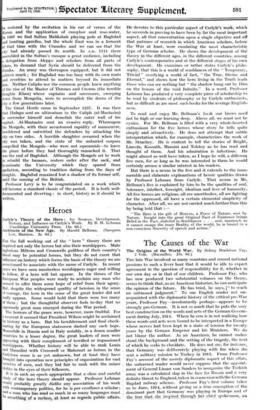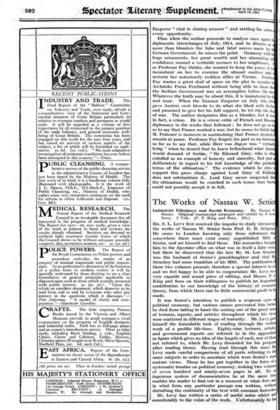The Causes of the War
The Origins of the World War. By Sidney Bradshaw Fay. 2 Vols. (Macmillan. 378. 6d. ) THE late War involved so many countries and roused national passions to such a fever heat that it would be idle to expect agreement in the question of responsibility for it, whether in our own day or in that of our children. Professor Fay, who has now produced two substantial volumes on the theme, seems to think that, as an American historian, he can anticipate the opinion of the future. He has tried, he says, I" to reach an unbiassed judgment." To one English reader not un- acquainted with the diplomatic history of the critical pre-War' years, Professor- Fay—involuntarily- perhaps—appears to 'be strongly pro-German. It is not so much that he puts the very best construction on the words and acts of the German Govern-. ment during July, 1914. Where he errs is in not realizing how these words and acts were bound to be interpreted in a Europe' whose nerves had been kept in a state of tension for twenty years by the German Emperor and his Ministers. We do not blame the author. As an American, he cannot under- stand the background and the setting of the tragedy, the text. of which he Seeki to elucidate. He does not See, for instance, that GerMany was deliberately plaking with fire when she sent a military mission to Turkey in 1913. From Professor Fay's account of the merely diplomatic aspect of this affair, the unlearned reader would never suppose that the appoint- Ment of General Liman von Sanders to reorganize the Turkish army was a calculated slap in the face for Russia and a very definite threat to England, taken in connexion with the German Bagdad railway scheme. Professor Fay's first volume takes us to June, 1914, without giving us a true conception of the, dominant part that Germany was playing in EurOpe and of the_ fear that_ she _inspired through her chief spokesman, an Emperor " clad in shining armour" and rattling his sabre every opportunity.
Thus when the author proceeds -to analyse once again diplomatic interchanges of July, 1914, and to dismiss as more than blunders the false and fatal moves made by German Government, he misses the point. Germany with huge armaments, her great wealth and her abounding se confidence seemed a veritable menace to her neighbours. as Professor Fay thinks, she wanted to keep the peace, it It incumbent on her to exercise the utmost caution and restrain her notoriously reckless allies at Vienna. Prof Fay wastes a great deal of space on the plot to murder t Archduke Franz Ferdinand without being able to show tha the Serbian Government was an accomplice before the f Whatever the truth may be about this, it is immaterial to t real issue. When the German Emperor on July 5th, 191 gave Austria carte blanche to do what she liked with Serbi and promised to give her his full support, he let slip the do of war. The author designates this as a blunder, but it w- in fact, a crime. He is a severe critic of French and R diplomacy in the weeks that followed ; he does not go so as to say that France wanted a war, but he seems to think t M. Poineare is insincere in maintaining that France desired remain at peace. Professor Fay forgets his part as an histo • so far as to say that, while Herr von Jiigow was virtual lying " when he denied that he knew beforehand what Aust would demand of Serbia, " Sir Edward Grey, who is oft extolled as an example of honesty and sincerity, lied just deliberately in regard to his full knowledge of the proba terms of the ultimatum." The evidence which he cites support this gross charge against Lord Grey of Fallod does not substantiate it. Lord Grey never suspected tha the ultimatum would be couched in such terms that Serb could not possibly accept it in full.



















































 Previous page
Previous page